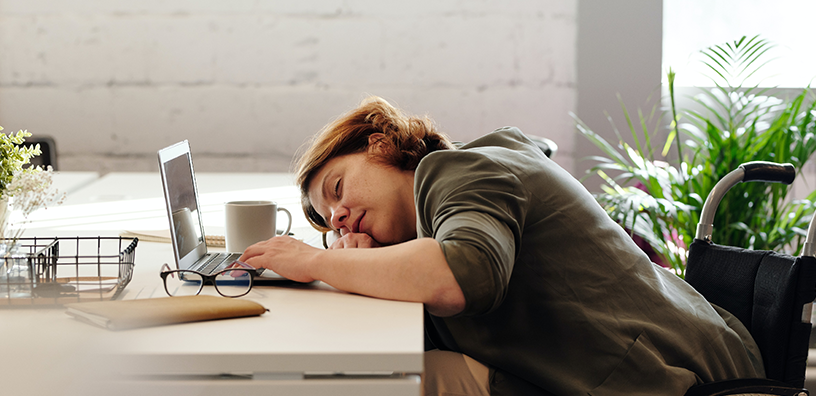
What Happens When You Don't Sleep
Sleep is an important part of staying healthy. We need 8-10 hours and blissful, uninterrupted sleep to really take on the challenges of everyday life. But what happens when you don’t get the sleep you need? We’re breaking down the short and long term effects of sleep deprivation and giving you the tools you need to conquer your sleep.
Short term
Cognitive Slowness

If you’ve ever gotten little sleep, you probably noticed that you’re not nearly as sharp as you are when you get a good night’s sleep. This is because your brain, like the rest of your body, needs time to rest and recover. When you deny it rest or don’t sleep enough, the brain becomes overworked. This makes doing simple cognitive tasks, like working and driving, a challenge. In fact, science has shown that you are less creative when you’re tired.[1]
Impaired Vision
Another section of your body that gets a break during sleep is your eyes. Essential to your daily activities, vision is given a moment of rest when you settle in for the night. Lack of sleep causes your eyes to strain. This is made worse when looking at a phone, tablet, or computer screen. The longer you go without sleep, the redder, and more bulged your blood vessels become.[2]
High Blood Pressure and Cortisol

Sleep is incredibly important for everyone, but for those prone to high blood sugar, the importance is even greater. It’s believed sleep helps your blood regulate the body’s stress hormone cortisol. Without proper sleep, your body loses its ability to regulate cortisol levels. This leads to an increase in stress and blood pressure.[3]
Increased Eating
Extensive research has been done on the effects of sleep eating habits and scientists have come up with some interesting results. Just one night of missed sleep can drastically change the levels of ghrelin and leptin in the body. Ghrelin increases appetite (feeling hungry) and leptin decreases hunger (feeling full). When you lose sleep, your body produces more ghrelin and less leptin, leading to cravings and overeating.[4]
Decreased athleticism

Lack of sleep can be detrimental to athletic performance. Like we mentioned before, lack of sleep leads to cognitive slowness. This slowness affects split-second decision making and reaction time. When exercising you exert incredible amounts of energy and fluids. Sleep helps replenish these, as well as heal muscles and allow for growth. Lack of sleep subverts the recovery process and exercise becomes more dangerous, and in the long run, less effective.[5]
Long term
Serious Illness
The human body loves routine. This is especially true when it comes to sleep. When your body can get into a routine, sleep is easier. However, studies have shown that lack of sleep, especially to those who have a circadian rhythm disorder, are at a higher risk. Sleep deprivation strains the body and weakens the immune system, making it more susceptible to infection, prolonged illness, diabetes, heart disease, and even cancer.[6]
Hearing loss

Everything in the body is connected, so when one system is fatigued, the others usually follow. Sleep apnea, a sleeping disorder, has been shown in studies to lead to hearing loss. Though this is not confirmed, the link is strong, as sleep apnea has been associated with blood flow problems. Blood flow to the inner ear is vital for hearing, so any interruptions could lead to hearing loss.[7]
Skin problems
We’ve discussed how lack of sleep can cause cortisol, your stress hormone, to go into overdrive. Well, this isn’t just damaging for your blood pressure. Stress and lack of sleep can cause the skin to develop acne. It can even make existing skin issues like psoriasis and eczema worse.[8]
Weight gain

By far one of the most notable symptoms of sleep deprivation is weight gain. While weight fluctuates day-to-day (a completely normal occurrence), missing sleep can cause huge jumps in weight that can be difficult to lose. This is due once again to our good friends ghrelin and leptin. Lack of sleep causes unstable eating habits and a lack of motivation for exercise, culminating in weight gain.[9]
What can you do?
Well, the simple answer is to sleep more. Easier said than done, right? Here are a few tips to help you get the sleep you need.
- Exercise Regularly - Regular exercise burns calories and gets your body tired enough to stay asleep. Just don’t do any strenuous exercise before bed!
- Limit Electronics - Electronics before bed have been shown to inhibit melatonin production - your sleep hormone - causing you to be awake longer and lose sleep.[10] No phone or tv before bed!
- Don’t Eat Before Bedtime - Have you ever tried to sleep on a full stomach? It’s pretty uncomfortable. Avoid heavy foods before bed so your stomach doesn’t have to digest while you sleep.
- Tailor Your Bedding - This is a huge one! We don’t realize how vital our sheets are to our quality of sleep. Consider switching to lightweight bamboo viscose sheets. Our Cosy House Luxury Bed Sheets are best sellers due to their breathability, softness, and natural ability to stay fresher for longer. We’ve been told they’re better than cotton!
We've gone ahead & enclosed a 10% off coupon below for you to use if you'd like to take the plunge and try out our sheets for yourself! To shop our collection & get 10% OFF Use the code 'BLOG10' at checkout.
Resources:
-
Alhola, P., & Polo-Kantola, P. (2007). Sleep deprivation: Impact on cognitive performance. Neuropsychiatric disease and treatment, 3(5), 553–567.
-
Epstein, L. (2021, May 10). How lack of sleep affects your eyesight. Sleep Education. Retrieved April 15, 2022, from https://sleepeducation.org/lack-sleep-affects-eyesight/
-
Carev, M., Karanović, N., Bagatin, J., Matulić, N. B., Pecotić, R., Valić, M., Marinović-Terzić, I., Karanović, S., & Dogas, Z. (2011). Blood pressure dipping and salivary cortisol as markers of fatigue and sleep deprivation in staff anesthesiologists. Collegium antropologicum, 35 Suppl 1, 133–138.
-
Greer, S. M., Goldstein, A. N., & Walker, M. P. (2013). The impact of sleep deprivation on food desire in the human brain. Nature communications, 4, 2259. https://doi.org/10.1038/ncomms3259
-
Fry, A. (2022, April 13). How sleep affects athletic performance. Sleep Foundation. Retrieved April 15, 2022, from https://www.sleepfoundation.org/physical-activity/athletic-performance-and-sleep
-
Institute of Medicine (US) Committee on Sleep Medicine and Research; Colten HR, Altevogt BM, editors. Sleep Disorders and Sleep Deprivation: An Unmet Public Health Problem. Washington (DC): National Academies Press (US); 2006. 3, Extent and Health Consequences of Chronic Sleep Loss and Sleep Disorders. Available from: https://www.ncbi.nlm.nih.gov/books/NBK19961
-
Chen, C. K., Shen, S. C., Lee, L. A., Sun, M. H., Chen, N. H., Chuang, L. P., & Li, H. Y. (2021). Idiopathic Sudden Sensorineural Hearing Loss in Patients with Obstructive Sleep Apnea. Nature and science of sleep, 13, 1877–1885. https://doi.org/10.2147/NSS.S331880
-
Kahan, V., Andersen, M. L., Tomimori, J., & Tufik, S. (2010). Can poor sleep affect skin integrity?. Medical hypotheses, 75(6), 535–537. https://doi.org/10.1016/j.mehy.2010.07.018
-
Sleep Restriction Enhances the Daily Rhythm of Circulating Levels of Endocannabinoid 2-Arachidonoylglycerol. Hanlon EC, Tasali E, Leproult R, Stuhr KL, Doncheck E, de Wit H, Hillard CJ, Van Cauter E. Sleep. 2016 Mar 1;39(3):653-64. doi: 10.5665/sleep.5546. PMID: 26612385.
-
Figueiro, M. G., Wood, B., Plitnick, B., & Rea, M. S. (2011). The impact of light from computer monitors on melatonin levels in college students. Neuro endocrinology letters, 32(2), 158–163.

